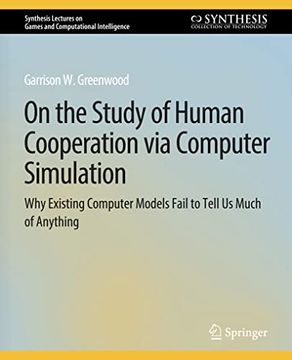Compartir
On the Study of Human Cooperation Via Computer Simulation: Why Existing Computer Models Fail to Tell Us Much of Anything (en Inglés)
Garrison W. Greenwood
(Autor)
·
Springer
· Tapa Blanda
On the Study of Human Cooperation Via Computer Simulation: Why Existing Computer Models Fail to Tell Us Much of Anything (en Inglés) - Greenwood, Garrison W.
$ 78.390
$ 142.530
Ahorras: $ 64.140
Elige la lista en la que quieres agregar tu producto o crea una nueva lista
✓ Producto agregado correctamente a la lista de deseos.
Ir a Mis Listas
Origen: Estados Unidos
(Costos de importación incluídos en el precio)
Se enviará desde nuestra bodega entre el
Jueves 25 de Julio y el
Martes 06 de Agosto.
Lo recibirás en cualquier lugar de Chile entre 1 y 3 días hábiles luego del envío.
Reseña del libro "On the Study of Human Cooperation Via Computer Simulation: Why Existing Computer Models Fail to Tell Us Much of Anything (en Inglés)"
Cooperation is pervasive throughout nature, but its origin remains an open question. For decades, social scientists, business leaders, and economists have struggled with an important question: why is cooperation so ubiquitous among unrelated humans? The answers would have profound effects because anything that promotes cooperation leads to more productive work environments and benefits society at large. Game theory provides an ideal framework for studying social dilemmas, or those situations in which people decide whether to cooperate with others (benefitting the group) or defect by prioritizing their self-interest (benefitting only the individual). The social dilemma is formulated as a mathematical game and then programmed into a computer model. Simulating the game allows researchers to investigate potential theories to explain how cooperation emerges and what promotes its persistence. Over the past 25 years, countless papers on social dilemma games have been published, yet arguably little progress has been made. The problem is the social dilemma game models are unrealistic in the sense they contain artificial constructs that deviate from the way humans act. This book describes the shortcomings in current social dilemma game modeling techniques and provides guidance on designing more effective models. A basic introduction to game theory is provided with an emphasis on the prisoner's dilemma, the most widely studied social dilemma game. Individual chapters are provided detailing the shortcomings of weak selection, spatial games, and the Moran process. Computer model validation is also discussed at length. The recommendations found in this book should help design more realistic social dilemma game models likely to produce a better understanding of human cooperation.
- 0% (0)
- 0% (0)
- 0% (0)
- 0% (0)
- 0% (0)
Todos los libros de nuestro catálogo son Originales.
El libro está escrito en Inglés.
La encuadernación de esta edición es Tapa Blanda.
✓ Producto agregado correctamente al carro, Ir a Pagar.

